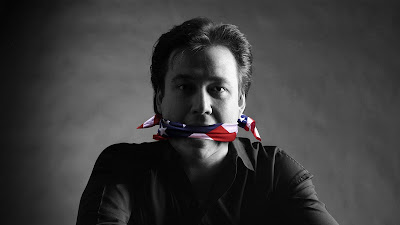 |
| Kat (Molly Parker) and Vic (Tracy Wright) in Trigger. |
Bang up job
By Don Simpson
Vic (Tracy Wright) and Kat (Molly Parker) are best known for fronting Toronto’s famed 1990s grrrl rock band,Trigger. As is often the case with rock and roll, drugs, alcohol, sex and egos — in no particular order — were all to blame for the band’s thorny demise. In an instant, Trigger was gone.
Director Bruce McDonald’s Trigger finds the two fallen rock stars a decade or so later. After not speaking to each other since Trigger’s break-up, Vic and Kat find themselves facing off across a small table at a chic modern restaurant. Their reunion could not start off much worse. Kat shows up an hour later than Vic, then her cellphone rings (important business to which she must attend). Vic’s disdain for Kat’s fun, flighty and flirty personality promptly rears its ugly head. Both women flash their claws. A violent fight seems eminent. The question remains: Will it happen before, during or after the benefit they are both scheduled to attend?
Over the course of one single night, Vic and Kat regurgitate their history. A battle between ideologies and lifestyles commences. They judge their own pasts -- fluidly alternating between the romanticism and hatred of their memories -- while criticizing each other’s presents. A lot has changed since their days in Trigger. Vic is a recovering drug addict, who still resides in Toronto; she looks to a book titled The Spirituality of Imperfection for the answers to life’s questions, and is negotiating the release of a solo album. The “terminally unique” Kat is a recovering alcoholic; she long ago abandoned Toronto for Los Angeles (well, Silverlake) and works as a music supervisor for Lifetime. Eventually, Vic and Kat’s fiery philosophical clashes simmer down long enough for the two women to delicately discuss their fears and aspirations, as well as their unique perspectives on aging, dying, relationships and love.
On the surface, Trigger plays like a romantic stroll around Toronto at night, as Vic and Kam act as our guides, but the locations are far from romantic (other than Allan Gardens) or noteworthy. At its heart Trigger is a talkie. Trigger is all about screenwriter Daniel MacIvor’s uncanny command of the English language. Ranging from gracefully poetic to subtly rhythmic to downright spastic, the dialog twists and turns between mean, raunchy and bittersweet; yet despite the literary flourishes, every word and every phrase seems perfectly natural. It is completely believable that Vic and Kat would speak in these somewhat affected ways.
Speaking of… Wright and Parker’s performances are nothing short of amazing.Trigger finds both actors at the pinnacle of their craft, portraying characters that were seemingly custom crafted just for them. What reportedly started off as a sequel to McDonald’s punk mockumentary, Hard Core Logo (1996), Triggerquickly evolved into a farewell love letter to Wright, whose health was slipping due to pancreatic cancer. (Wright passed away in June 2010, at the age of 50.) I do not know if Wright’s portrayal of the world-weary Vic, accentuated by her sunken eyes and graying skin, is more amazing if you know she was dying when she shot Trigger or not. No matter what, I cannot imagine a more appropriate swan song for an actor.
